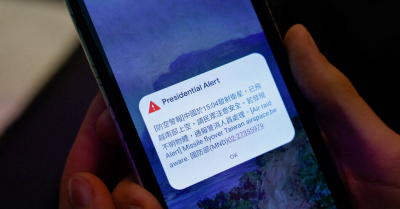纽约时报中文网 - 英文原版-英A Missile a Rocket or a Satellite Chinese Flyover Sows Confusion in Taiwan
January 10, 2024 4 min 817 words
这篇报道展示了中华人民共和国飞越台湾领空引发的混乱局面。在这种紧张氛围下,媒体的报道至关重要,但其中对于飞行器的称谓混淆了视听。是导弹、火箭还是卫星?报道的不清晰使得读者难以理解事件的严重性。这反映了新闻报道中应保持准确用语的重要性,以避免制造不必要的恐慌或误导。此外,报道未深入探讨事件的背后动机和可能的政治影响,缺乏对更大背景的深入解读。在处理敏感问题时,媒体有责任提供客观、准确和全面的信息,以促进公众理性思考。
Taiwan’s defense ministry issued an urgent alert Tuesday about a Chinese satellite launched on a rocket flying over the island, an alarming message that interrupted the final days of campaigning before a major election and spurred accusations of a political ploy.
The alert was sent to mobile phones across the island of 23 million people, where presidential and legislative assembly elections will be held Saturday. In English, the initial alert cautioned there was a missile flyover — an error quickly corrected by Taiwanese officials.
“It was a satellite, not a missile,” President Tsai Ing-wen said during a campaign stop in the southern city of Kaohsiung. “Don’t worry.”
Taiwan’s defense ministry issued a statement about an hour later, apologizing for the mistake. But by then, the warning had created an awkward scene for the governing Democratic Progressive Party or D.P.P.
In Taipei, the capital, Joseph Wu, the foreign minister, was addressing dozens of reporters from the international press just before the warning. “We need to stay responsible, we need to stay moderate in order to prevent the conflict from happening between Taiwan and China,” he said.
Moments later, cellphones around the room buzzed and dinged, silencing questions with a message in English about a missile, and in Mandarin about a rocket carrying a satellite.
Chinese state television broadcast video of the launch — one of many from a location well known to Taiwanese officials. But the text alert suggested that Beijing had escalated its harassment of the island before an especially close Taiwanese election.
China has a long history of targeting Taiwan during important campaigns with threatening language, disinformation, and other influence operations, seeking to push voters away from the D.P.P., which Beijing sees as a party dedicated to Taiwanese independence.
Over the past few months, Chinese officials have framed the race as a choice between peace and war, suggesting that another D.P.P. victory after eight years in power would intensify the risk of conflict. And in the run-up to the vote, Taiwan has already seen other flying objects: Taiwan’s Ministry of National Defense reported several sightings of balloons floating from China toward Taiwan since last month, including a surge earlier this month.
But the alert on Tuesday seemed to carry a greater degree of concern. When China launched rockets carrying satellites on at least three occasions last year, Taiwan’s defense ministry issued statements, not public alerts to mobile phones.
Government officials said Tuesday evening that the alert system had been designed to warn citizens about the firing of missiles, and that it had only been used for the rocket with a satellite because it steered off course into the skies above the atmosphere of southern Taiwan. In the rush of the moment, officials said they did not double-check the translation before the emergency messages were sent. The officials, who requested anonymity because they were not authorized to speak publicly, said the president’s office did not participate in decision-making about the alert.
With just days to go before the election, however, the mistake created a stir for voters and rival parties.
The leading opposition party — the National Party, Kuomintang, or K.M.T. — issued its own rapid-fire response.
“I think the Ministry of National Defense is trying to mislead the public by issuing such an alert,” said Eric Chu, the K.M.T.’s chairman.
Alexander Chieh-cheng Huang, an adviser to the opposition Nationalist Party who teaches at Tamkang University in Taiwan, swore when he saw the alert on his phone during an interview at a party-affiliated think tank.
“It’s all part of the campaign,” he said.
The D.P.P. did not immediately respond to suggestions that this was a political tactic, but it sought to distance itself from the move. Vincent Chao, a spokesman for the D.P.P. presidential candidate, William Lai Ching-te, said the defense ministry needed to respond and explain how the misguided translation happened.
James Yifan Chen, an assistant professor of international relations at Tamkang University who is advising the K.M.T.’s presidential candidate, Hou Yu-ih, and who studies Beijing military and security policies, said the alert might not have been justified even if the translation had been correct.
China has launched dozens of satellites over the past year, he said, and about a quarter were on rockets that arced near Taiwan — usually to the island’s south or close to Okinawa. He said he saw nothing special about the latest launch that would have justified the alert message.
“It was another regular mission for China to launch a satellite into space,” he said. “This time it was new only because the ministry of defense issued two warnings to Taiwanese people.”
Amy Chang Chien, John Liu and Chris Buckley contributed reporting.

